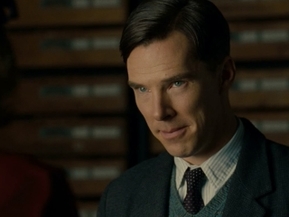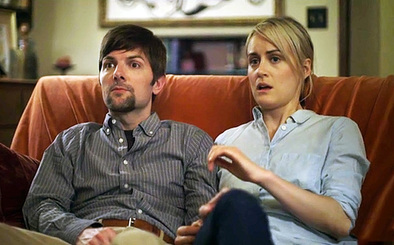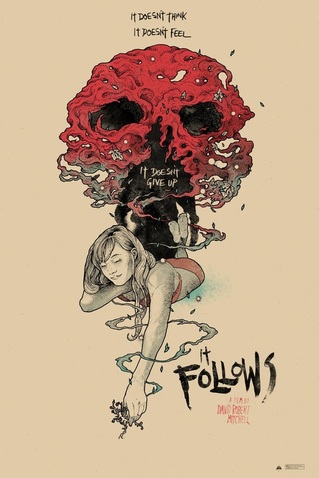
The central metaphor at the heart of The Imitation Game is so perfect and tidy that it beggars belief. Socially inept, on-the-spectrum Alan Turing is great at cryptography because his whole life has been about decoding simple human behavior. Lacking in the emotional intelligence to decipher a smile or a shrug, he's instead blessed with the raw brainpower necessary to be one of the most important components of the Allied victory over the Nazis. The additional irony of a man dedicated to breaking secrets keeping several of his own makes Morten Tyldum's film a tidy, easily digestible package. The biopic form compressed into a diamond, The Imitation Game keeps things as straightforward as possible, eliding the man who was for the man most accessible.
The Imitation Game covers three sections of Alan Turing's (Benedict Cumberbatch) life. The earliest involves Turing (played as a teenager by Alex Lawther) enduring an isolated life at a posh boarding school. The latest involves his post-war run-ins with the law and the British government after being exposed as a homosexual. The middle section, featuring his work at Bletchley Park during WWII, makes up the bulk of the film, though Tyldum hops frequently between periods. At Bletchley Park, Turing is hired to lead the attempt to decipher the Nazi Enigma code, a code that, in addition to its complexity, resets itself every midnight, making the prior day's work useless. Turing is uninterested in the work by hand that consumes his comrades' time, and instead, sets to build a machine that can do many different combinations at a much faster rate. His superiors, represented by Commander Denniston (Charles Dance) are skeptical of his methods and frustrated by Turing's disrespect for the chain of command, pestering him to get results or be kicked off the project.
Aiding Turing are the debonair Hugh Alexander (Matthew Goode) and the brilliant Joan Clarke (Keira Knightley), among others. Alexander is baffled that this spaz has supplanted him as project lead, though he's eventually won over by Turing's plainly superior skills. Clarke is the closest thing to a romantic foil for wartime Turing, as he enters into a relationship with her, less out of an emotional impulse and more out of the practical need for her to remain on the project. His actual romantic career is left to the school days, a sensitive teen romance subplot that somehow manages to be the most affecting part of the film. The shaky resolve and tentative hopefulness an excellently-cast Lawther demonstrates is the equal of anything Cumberbatch is doing as the adult Turing.
The wartime scenes that make up the bulk of the film are also the most formulaic. Substitute 'breaking Enigma' with any other achievement, from 'winning championship' to 'inventing something,' and the same beats are there. Initial scoffing at a new way of doing things, getting to know the team, ingratiating the team to the lead, possible romantic subplot, breakthrough, celebration, victory snatched from team, ultimate victory awarded. What saves it from being interminable are the performances. Cumberbatch is predictably strong in the lead, as he's in control of every tic and twitch at every moment. Goode and Knightley play off of him well, with Alexander's back-slapping throwing Turing off his game and a perceptive Clarke as the only person Turing can be trust. The realities of spycraft at this high a level also add a new wrinkle to the formula. The catharsis of ultimately breaking Enigma once and for all is immediately undercut, as the new problem becomes deciding exactly how many attacks can be stopped without tipping the Nazis. That calculus is the most interesting thing in the film, though it's short-changed with two scenes and a montage. Someone will eventually make a movie about Robert McNamara and Curtis LeMay, and Imitation Game is a nice appetizer to that future film.
While the subpar script somehow managed to win an Oscar despite its banal tautologies and fixed beats, the man at the center of The Imitation Game makes it worthy of existence. A secular martyr whose name isn't known by enough people, Turing at least gets a performance worthy of him. The post-war period of the film, in which Turing is arrested and chemically castrated, deserved more time, especially his supposed suicide that may very well have been an accident, though the film openly declares it a suicide in a postscript. That is the man I most wanted to know about, the one that (possibly) decided to withhold his genius from society if society would deign to treat him so poorly. In lieu of the fiery-to-the-end Turing, Tyldum depicts him as a neutered, blabbering hermit. That desire to make Turing a victim is disappointing, but just one more form of dramatic license that The Imitation Game liberally indulges in. C+



 RSS Feed
RSS Feed